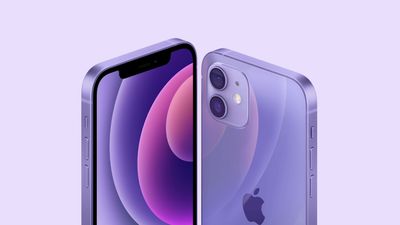Apple Begins Transition to Randomized Serial Numbers With Purple iPhone 12
MacRumors previously reported about Apple's plan to switch to randomized serial numbers for future products starting in early 2021, and this transition has now started with the new purple iPhone 12 model in multiple countries.

With assistance from Aaron Zollo, host of the YouTube channel ZolloTech, we can confirm that the purple iPhone 12 released last month has a new 10-character serial number format, compared to the usual 12 characters for most other Apple products. Apple previously said its randomized serial numbers would initially be 10 characters long, so the purple iPhone 12 appears to be the first Apple product with a randomized serial number.
The change likely extends to the purple iPhone 12 mini, but we've yet to confirm this. On the contrary, the randomized serial number format does not appear to apply to the AirTag at this time, with multiple MacRumors editors and others we've spoken to still seeing 12-character serial numbers for the item tracking accessory.
It remains to be seen if the new iMac, iPad Pro, and Apple TV have randomized serial numbers when they launch in the second half of May.
In a memo obtained by MacRumors in March, Apple said products already shipping at that time would continue to use the company's previous serial number format, which has for years allowed customers and service providers to determine the date and location that a product was manufactured. The first three characters represent the manufacturing location, the following two characters indicate the year and week of manufacture, and the last four characters reveal a device's model, color, and storage capacity.
The new serial number format will consist of a randomized alphanumeric string of 8-14 characters (10 characters initially) that will no longer include manufacturing or configuration details, according to Apple's memo. Apple advised authorized resellers to prepare for the transition to the new format ahead of its "Spring Loaded" event last month.
Popular Stories
The long wait for an Apple Watch Ultra 3 appears to be nearly over, and it is rumored to feature both satellite connectivity and 5G support.
Apple Watch Ultra's existing Night Mode
In his latest Power On newsletter, Bloomberg's Mark Gurman said that the Apple Watch Ultra 3 is on track to launch this year with "significant" new features, including satellite connectivity, which would let you...
The iPhone 17 Pro Max will feature the biggest ever battery in an iPhone, according to the Weibo leaker known as "Instant Digital."
In a new post, the leaker listed the battery capacities of the iPhone 11 Pro Max through to the iPhone 16 Pro Max, and added that the iPhone 17 Pro Max will feature a battery capacity of 5,000mAh:
iPhone 11 Pro Max: 3,969mAh
iPhone 12 Pro Max: 3,687mAh...
The upcoming iPhone 17 Pro and iPhone 17 Pro Max are rumored to have a slightly different MagSafe magnet layout compared to existing iPhone models, and a leaked photo has offered a closer look at the supposed new design.
The leaker Majin Bu today shared a photo of alleged MagSafe magnet arrays for third-party iPhone 17 Pro cases. On existing iPhone models with MagSafe, the magnets form a...
iOS 26 and iPadOS 26 add a smaller yet useful Wi-Fi feature to iPhones and iPads.
As spotted by Creative Strategies analyst Max Weinbach, sign-in details for captive Wi-Fi networks are now synced across iPhones and iPads running iOS 26 and iPadOS 26. For example, while Weinbach was staying at a Hilton hotel, his iPhone prompted him to fill in Wi-Fi details from his iPad that was already...
Apple's position as the dominant force in the global true wireless stereo (TWS) earbud market is expected to continue through 2025, according to Counterpoint Research.
The forecast outlines a 3% year-over-year increase in global TWS unit shipments for 2025, signaling a transition from rapid growth to a more mature phase for the category. While Apple is set to remain the leading brand by...
Apple today seeded the second betas of upcoming iOS 18.6 and iPadOS 18.6 updates to public beta testers, with the betas coming just a day after Apple provided the betas to developers. Apple has also released a second beta of macOS Sequoia 15.6.
Testers who have signed up for beta updates through Apple's beta site can download iOS 18.6 and iPadOS 18.6 from the Settings app on a compatible...
Apple's next-generation iPhone 17 Pro and iPhone 17 Pro Max are just over two months away, and there are plenty of rumors about the devices.
Below, we recap key changes rumored for the iPhone 17 Pro models.
Latest Rumors
These rumors surfaced in June and July:Apple logo repositioned: Apple's logo may have a lower position on the back of the iPhone 17 Pro models, compared to previous...




















